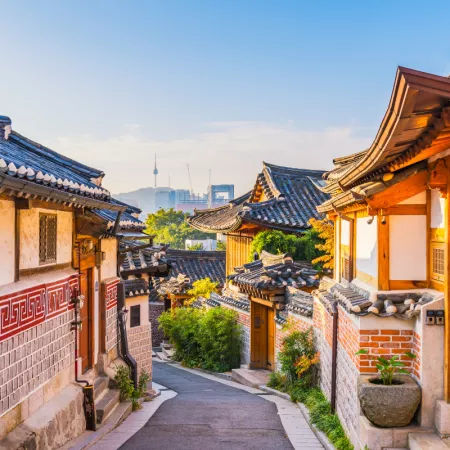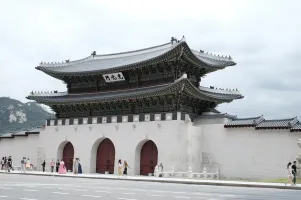
Seoul Travel Guide
Seoul, the capital of South Korea, is a vibrant metropolis known for its rich history, stunning landscapes, and cutting-edge technology. Nestled along the Han River, Seoul seamlessly blends ancient traditions with modernity, offering visitors a unique cultural experience. The city is famous for its bustling markets, historic palaces, and mouthwatering cuisine, making it a must-visit destination for travelers around the world.Top Attractions in Seoul
- Gyeongbokgung Palace
- Myeongdong Shopping Street
- Bukchon Hanok Village
- N Seoul Tower
- Han River Cruise
Seoul is Famous for
Shopping districts like Myeongdong and Dongdaemun are famous for their trendy fashion and cosmetics.Top Attractions in Seoul
- Exploring the ancient Gyeongbokgung Palace
- Indulging in street food at Namdaemun Market
- Visiting the vibrant Insadong neighborhood
- Hiking up Bukhansan Mountain for panoramic views
What's Great about Travelling to Seoul?
- Rich cultural heritage
- Delicious and diverse cuisine
- Efficient public transportation
What's Not So Great about Travelling to Seoul?
- Language barrier for non-Korean speakers
- Crowded tourist attractions
- High cost of living
Travel Tips for Seoul
- Check visa requirements before traveling
- Use T-Money card for convenient transportation
- Stay cautious of pickpockets in crowded areas
Important Seoul trip information
- Ideal Duration: 5-7 days
- Best Time to Visit: Spring (March to May) and Fall (September to November)
- Nearby Airports and Railway Stations: Incheon International Airport, Seoul Station
Top 13 Places to visit in Seoul
Per Person
51,599
*EXCLUDING APPLICABLE TAXES 5.0 Ratings
( 21 Reviews )
( 21 Reviews )
Per Person
3,50,000
*EXCLUDING APPLICABLE TAXES Per Person
4,30,000
*EXCLUDING APPLICABLE TAXES FAQ's on Seoul
Q1: What is the best time to visit Seoul?
The best time to visit Seoul is during the spring (April to June) and autumn (September to November) when the weather is mild, and the city is adorned with cherry blossoms or colorful foliage. Avoid the hot and humid summer months and the cold winter season if you are not a fan of extreme temperatures.
Q2: Do I need a visa to travel to Seoul?
vary depending on your nationality. Many countries are visa-exempt for short stays, while others may require a visa. Make sure to check the specific requirements for your country before traveling. South Korea also offers visa-free entry for certain nationalities for tourism purposes.
Q3: What are the must-visit attractions in Seoul?
Seoul boasts a rich cultural heritage and modern attractions. Don't miss iconic sites like Gyeongbokgung Palace, Bukchon Hanok Village, N Seoul Tower, and vibrant neighborhoods like Myeongdong and Hongdae. Explore traditional markets like Namdaemun and enjoy the bustling atmosphere of Gangnam district.
Q4: Is Seoul a safe place to travel?
Seoul is generally considered a safe city for travelers. However, like any other major city, it's essential to stay cautious, especially in crowded areas and at night. Avoid demonstrations, follow basic safety precautions, and be aware of pickpockets in touristy areas.
Q5: What is the local currency in Seoul and can I use credit cards?
The local currency in Seoul is the South Korean Won (KRW). Credit cards are widely accepted in shops, restaurants, and hotels, especially in tourist areas. However, it's advisable to carry some cash for smaller establishments or street vendors. ATMs are plentiful in the city for easy currency exchange.
Q6: What is the local cuisine like in Seoul?
Seoul offers a diverse culinary scene with dishes like bibimbap, bulgogi, kimchi, and street food favorites such as tteokbokki and hotteok. Vegetarians and vegans may find options like bibimbap or vegetable kimbap. Embrace the local dining culture by trying Korean BBQ and traditional tea houses.
Q7: What transportation options are available in Seoul?
Seoul has an efficient transportation system that includes subways, buses, taxis, and ride-sharing services. The subway is a convenient way to navigate the city, while buses are ideal for reaching specific destinations. Taxis are widely available, but language barriers may exist. Consider renting a bike for exploring parks and riverside paths.
Q8: Are there any cultural norms or etiquette I should be aware of when visiting Seoul?
When visiting Seoul, remember to bow slightly as a sign of respect when greeting someone. Remove your shoes before entering homes or traditional establishments. Refrain from displaying excessive public affection and be mindful of your volume in public spaces. Learn a few basic Korean phrases like "hello" (annyeonghaseyo) and "thank you" (gamsahamnida) to show appreciation for the local culture.
Q9: I am a travel agent. How can I buy travel leads of Seoul?
Register yourself as a travel agent at agents.tripclap.com and then you can buy travel leads to Seoul once your account is approved. For more details contact our support team at +91-8069186564 or support@tripclap.com



